Ahoy, squirts! Quint here with Part 2 of the giant Michael Biehn interview! There’s some amazing stories here, including Michael’s work with William Friedkin, Nicolas Cage, Michael Bay, Robert Rodriguez and his own wife! There’s some real gold here! Enjoy!
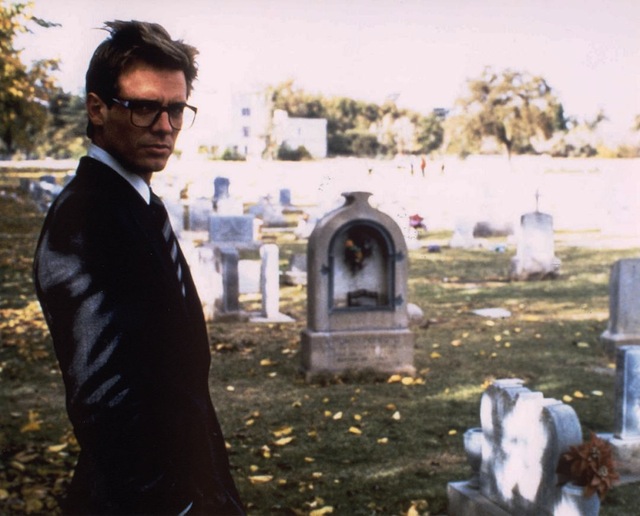
Quint: I haven’t actually gotten a chance to see the William Friedkin movie you did, Rampage. It’s not an easy movie to track down, but I’m a huge Friedkin fan. I definitely would like to talk a little bit about working with William Friedkin, especially since he has such a reputation of being tough on his actors.
Michael Biehn: Well earned. (laughs)
Quint: (laughs) One of my favorite Friedkin stories is one he tells with great relish and glee on The Exorcist DVD. They had a real priest playing Father Karras’ friend and Friedkin just wasn’t getting what he wanted out of him at the end when he has to give Karras his last rites at the bottom of the stairs. The story is that he goes up, and he just slaps this priest as hard as he can and then calls action. The guy is just dumbstruck. He’s shaking. He’s angry. He’s upset. Then he gives the performance that they kept in the movie; his hands are shaking and he’s giving the last rites to Karras. I don’t know if there was anything quite like that with you, but I would like to talk about that a little bit.
Michael Biehn: Well, he didn’t slap me, but he did slap Angie Everhart. I think that’s a pretty well known one. I did two films with Billy. One was a really good film and the other was a complete and total disaster.
Quint: Oh yeah? Which is which?
Michael Biehn: I did Rampage, which I thought was a pretty good movie and then I did another one with him called Jade, which was just garbage. It was terrible. Joe Eszterhas wrote the script and it was this really expensive script. When I read it I didn’t even understand it. It was so confusing to me. I didn’t even realize it until I got up there and we got into the table reads and stuff that I was supposed to be the bad guy!
The thing I like about Billy is that Billy will call you up and offer you the role and pay you a fair price and he’ll treat you (well) in that respect. He doesn’t make you come crawling for the role and reading and rereading and all of that kind of stuff.
He likes to challenge his actors, there’s no doubt about that. He challenges you to the extent to where he can find a weakness in you and then he will plunge a knife in there and try to gut you as a person and as an actor. I think that it keeps you on your toes. In real life, like when you are not on the set, Billy is the nicest most articulate fun loving, poker-playing guy. He can talk about history and opera and fashion and women… He is just a lovely, interesting man to be around and I love Billy Freidkin. I love him to death, but you get him on a set and he turns into the devil.
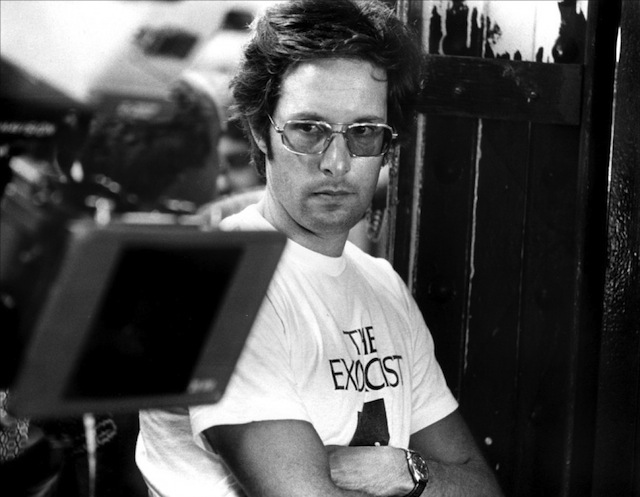
He really turns into the devil. I mean, he can be as mean as you have ever seen anybody be in real life to people because I believe he wants to create an atmosphere around his set that pops with electricity. When he used to come onto those sets, man, it was like fucking the Devil himself was fucking coming onto the set. Everybody was fucking scared to death of Billy Friedkin because he would find your weak spot and then go after you, but I love him for it!
He’s passionate and I believe that he did that because he thought that that would make his movies better and that he would keep people on their toes. If you were ever caught reading a fucking newspaper or something like that on his show or fucking around with makeup on yourself, he’d get crazy! I mean he was all into the moment having energy.
He was a lot of fun to work with, but scary. I had my first face down with him on Rampage where I had spent like three or four weeks working with him on the script and the character at his house and at restaurants and gotten to know him really well. I kept saying to my agent, “This guy is great, man. I don’t understand what everybody is talking about, this guy’s wonderful.” We got up to Stockton, California and everybody was supposed to stay in this hotel and I wanted to stay in this little house that was right next to the hotel, so that’s what I did.
I rented this little house where literally you could throw a stone from the house to the hotel and I was in wardrobe one day and somebody comes running in and goes “Billy wants to see you. He’s really pissed.” I had never even seen Billy like this before, you know? He’d only been this nice jovial guy. I walk into his office and he proceeds to dress me down for not living on the property in case they needed to get a hold of me. He fucking rips me a new asshole and I’m just stunned. I turned around, I walk out of his office, he follows me out of his office, he puts his hand on my shoulder and I turned and I knocked his fucking hand off my shoulder and I said “If you ever talk to me like that again, I’m going to kick your fucking teeth down your throat.”
He was standing there face to face with me and he was all fucking acting like he was angry and I said “I will kick your fucking ass” and he just looked at me and started taking a few steps backwards and just walked away from me, never gave me anymore fucking problems on the movie.
But he did give everybody else problems on the movie and he got me in Jade a couple of times where he was able to break me, where I couldn’t get a line right and he’s like “Do it again. Do it again! Cut! God damn it, roll cameras. Come on Michael, you can do it! God Damn it. Cut. Alright, take ten and come back, Michael go take some air…” He’d just lay it all on you, you know? He’s just crazy that way, but he is an interesting guy.
He’s made, I think, the best police drama ever made, The French Connection and the best horror movie ever made, The Exorcist. So all of these guys, whether its him or Jim Cameron or Michael Bay or a lot of guys, they all have their different ways of working.
I would do another movie with Friedkin. Right now I would like to be working with Friedkin. I would like to be working with Cameron right now. I would like to be working with Michael Bay right now. I would like to be working for a lot of guys that are “difficult,” but those are the guys that really care. Those are the guys that make the great movies, you know?
Quint: Was there any noticeable difference in how Freidkin worked on Rampage versus Jade or did the movies not come together all just completely based on the source material?
Michael Biehn: Rampage didn’t have any stars in it. I was the only star of it and I’ve never really been a movie star, but it was after The Terminator and I had gotten a little bit of heat, but it didn’t have any stars in it. The thing about Jade was that he had more personalities around. First of all he had David Caruso around, who is very, very smart and David doesn’t suffer fools lightly and he is perfectly capable of standing up to Friedkin.
We also had Chazz Palminteri on the set and right when we were shooting that movie he was crossing he street to go to the Academy Awards luncheon and so on and so forth and Lara Flynn Boyle was on that picture and she had just finished that movie that John Dahl directed and so everybody was hot and everybody had a personality and Friedkin was still Friedkin, but he didn’t bully his way around that set the way he did Rampage because there were other personalities.
Like on Tombstone… you don’t get any prima donnas on Tombstone when you’ve got Sam Elliot and Bill Paxton and Kurt Russell and Kilmer and everybody. You name it and you’ve got all of those people on the set and nobody wants to be the asshole, nobody “doesn’t come out of their trailer.” It just doesn’t happen when you have that kind of cast. That’s more likely to happen when you have a smaller group of people and personalities that won’t stand up to the person that’s in charge.
I’ll tell you, to be perfectly honest with you Eric, I was as bad or worse than Friedkin or Jim Cameron has ever been. I’ve never seen Jim really blow up and scream at people and stuff, but I did. I screamed at people all of the time, but I didn’t call them names. I didn’t say, “You are an asshole, fuck you.” I was saying, “This isn’t working. Quit talking. You can’t be talking during the shot! Get the fuck out of the shot,” like all of that kind of stuff.
I never attacked anybody personally, but I screamed all of the time at people to “Let’s get it right” and I’m proud to say that nobody quit. I wouldn’t fire anybody. I’d get angry in the moment and then it just passes. I’m kind of like a paper lion, I think after a while they are like “Alright, we’ll just wait for Michael to explode… Okay, he’s doing his thing now. Okay, we can go back to work.” I think by the end of the movie nobody would pay any attention to me at all, but at first I think that people were like “Well, he’s a little crazy.” I don’t know how or why I had to be that way. I wish I could be like Ron Howard. I wish I could be like Clint Eastwood. I wish I could just be like that, but I can’t.
I have to be in it and I have to be part of it and it has to be… You know we shot (The Victim) in twelve days and we didn’t have a lot of money and I knew that what was going to go on screen was me. I’m the director. I’m the writer. What is going to end up on screen is me, so it was very important to be that we got the right stuff up there and maybe that’s why.
If I’m working in a Jim Cameron movie or a Friedkin movie or whoever is the next guy it’s his movie and I’m just an actor in it. I don’t have to take credit for it. I don’t have to take credit for that whole movie, everything that’s inside of the frames. This one I did and I brought it on myself by saying “I’m the one who makes all of the decisions,” but there was not only my job as an actor or as a director, but I also had to organize. I had to find locations. I had to dress sets and I also had to fight, stunt fight, and show people how to throw fights and how to grab and I also fucking helped with makeup and you know I did everything with everybody.
That’s not to say that I didn’t have a lot of help, I did, but I wore everybody’s hat because if it wasn’t right, if it wasn’t perfect whether you were dressing a set or whether you were putting makeup on… I get a little worked up just talking about it, because now I’ve finally relaxed and I don’t have to deal with it anymore, but we’re talking about making a sequel for it. (laughs)
Quint: Now you’ve got to amp back up again.
Michael Biehn: I don’t know if my poor old heart... I’m getting too old for this, Eric.
Quint: Even though you are not in the movie for too long, we have to talk about The Rock, which is one of Michael Bay’s best films, I think. I was on the set of Transformers and found it very interesting how he directed. He almost acts like his own AD, whipping the crew into shape and keeping them on task. It seems like that actually kind of endeared him a little bit to the crew. What are your impressions? Is that something that you noticed when you worked with him?
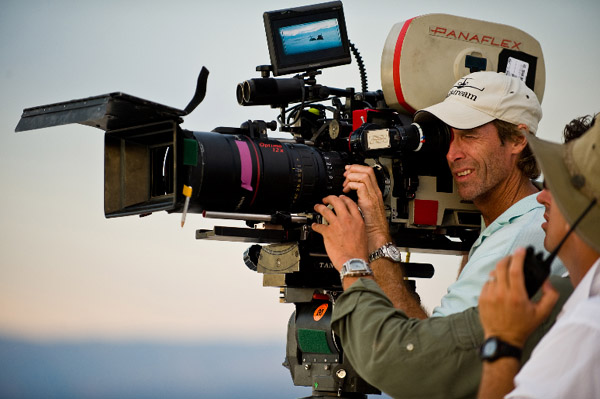
Michael Biehn: You know, I think that Michael probably was a little bit less aggressive I would say with the crew and the actors on The Rock because at that point, I think he had done Bad Boys… I’m not sure what his previous credits had been up to that point, but he hadn’t worked with Sean Connery, I know that. Nicolas Cage I think at that point had already one an Academy Award and Ed Harris, nobody walks on Ed Harris. Ed Harris is a man’s man and nobody gets in Ed Harris’s face or makes fun or does anything around Ed Harris, believe me. And I’m pretty much the same way too.
I’ll do what you say, but don’t disrespect me, so he had four strong alpha males around him on that movie, let alone guys like David Morse and Tony Todd. I mean there were some other guys in that movie, too. He had a lot of alpha males on that movie. He would get frustrated and high strung and yell here and there or whatever, but compared to what I did or what I’ve seen Friedkin do and you know it was nothing. It was like working with a pussycat, you know?
Quint: (Laughs) Once you’ve worked with Friedin, there’s not too much worse you can get.
Michael Biehn: I don’t think there is. I can’t imagine working for a more difficult guy than Friedkin and more scary… I mean he’d get truly scary. I mean scary in the way that you know… When you are put on the spot as an actor, you want to do your best job and if you can’t get a line out, most people are like “Alright, Michael, that’s cool… We’re just rolling now. You’re tired? I’ll put on a card for you.” Billy will sit there and he’ll do it on a soundstage. He’s notorious for looping a line and having me do it 100 times, looping a line. “No, Michael no! Do it again! You need more breath. No! That’s too much breath! Come on Michael, I know you’ve got it in you!”
I love Billy, but anybody who can sit for four hours and have you looping one line over and over again and then you go home and you say to the people that you are with “This guy had me in the fucking looping room and we are looping and he’s got one line for four hours I looped the fucking line” then the telephone rings, you pick up the telephone and it’s your agent and your agent says “Billy says he wants you back at looping tomorrow.” It’s like “What the fuck?” You go back there and he’s decided that it didn’t work you know and he loops another like two hours for the same line.
I think the biggest problem with Billy is I think that they won an Academy Award for sound on The Exorcist and ever since then he just builds everything and he loops everything, you know? He just builds this entire sound on the set. He’s the only person that I have ever worked with that I was intimidated by.
Quint: And you’ve worked with some of the biggest in the business, so that’s not said lightly.
Michael Biehn: Well, Robert and Quentin for instance are two guys that are exactly opposite of that you know? Especially Quentin. Quentin is just so much fun. He just seems like he’s having the time of his life dong what he wants to do and he just really enjoys himself and it seems like he just loves making movies and so does Robert. They both seem like they are two kids that are best friends, they are like twelve years old and they’ve broken into a candy store and they are just eating everything in sight. That’s the joy of working with Robert and Quentin. These guys live film, they breathe it almost, you know? That’s all they think about and they do it with such enthusiasm and with such youthful enthusiasm. I just admire both of them greatly for that sort of “Let’s have fun and do this.”
Robert to a certain extent… I get the feeling that Robert’s got the movie cut in his head while he’s writing a scene. He finishes a scene and knows how it’s going to be shot and how it’s going to be cut in his head already. He knows how he wants his actors to deliver those lines, so in a way he’s a little bit tougher to work with than some directors because a lot of the ideas that you come with that you think are great ideas, he’s like “No, no…” He will say yes to a lot of things. He said to the actors on the movie, “You guys if anybody’s got any ideas or thoughts or you want to write lines or if anybody even wants to write a scene, go ahead and write it. If I like it, I’ll put it in the movie.” He wants input, but he’s usually like “No, nope…” and then “Okay, yeah, yeah do that. That’s good Michael.”
He’ll want like a wink in a scene or something and you’re not going to get through that scene without winking for him. It was ever in your plan that you were going to do that wink, even though there’s a million different things going on with fires and bombs in the background and zombies walking through and guys shooting fire and trucks smashing into you, you know he’ll fucking after a take come by and tell everybody this and that and then look straight at me and go “Don’t forget to wink.” Then boom, that’d be it. (laughs)
He’s pretty awesome in his own way. When I was a kid I always wanted to hang out with the cool crowd. There was a cool bunch of guys and I always wanted to be with them and out of that crowd there was like that alpha dog, that coolest kid, like the coolest kid in school. To me that’s what Robert Rodriguez is, even now still to this day he walks into the room and he’s got all of this fucking jewelry on and he’s got his chain things with those wallets and his black cowboy hat on and he’s just bigger than life and just the coolest dude, man. He even talks like that. He uses words like “Dude” and he’s like a big kid, you know? He’s just the coolest kid around and I love being around him.
Quint: Yeah, you never feel like he’s talking down to you when he’s talking about movies. Both Robert and Quentin are people who I’ve had many conversations with about film and in none of those conversations did I ever feel like they were like “Oh, you haven’t seen that? Well, if you really loved movies, you would have seen that.”
Michael Biehn: Quentin would be more like “Well, let me set if up for you. Come over to my house on Friday and I’ll play it for you.” That’s Quentin! And Robert is the same way. Neither one of them, I think, have a mean bone in their body. I know that Robert, if he needs or wants something, he will stand strong like a statue and he’s like Mount Rushmore, man, if your plane doesn’t fly over it the way its supposed to, it’s going to hit Mount Rushmore!
I wrote a scene for him for my character and Freddy [Rodriguez’s] character. I wrote the scene and sent it to him because he said I could and he said, “I like the scene, Michael. I’m going to shoot it and we will put it in the movie.” So he shot it and it didn’t make it in the movie. I don’t even think it’s in the out clips or the extras or whatever, but he did shoot it on production time, so I was kind of proud of that.
Quint: What was the scene?
Michael Biehn: It was a scene between where I go out to arrest Freddy and I grab Freddy and I’m talking to him in the Police station and Tom Savini comes in and says “They bit my finger off.” That scene. It was going to be in-between those two scenes, it was walking through the cells up above and it was just some intimidating talk, if I’m not mistaken about how I told him he shouldn’t be here and now here he is back again, “it ain’t going to go easy on you this time…” You know, some bullshit like that.
I don’t remember what the lines were, but that’s what it was. It was in-between the time that I arrest him and the time that we played the scene that’s in the movie where Tom Savini shows me that he’s got the missing finger.
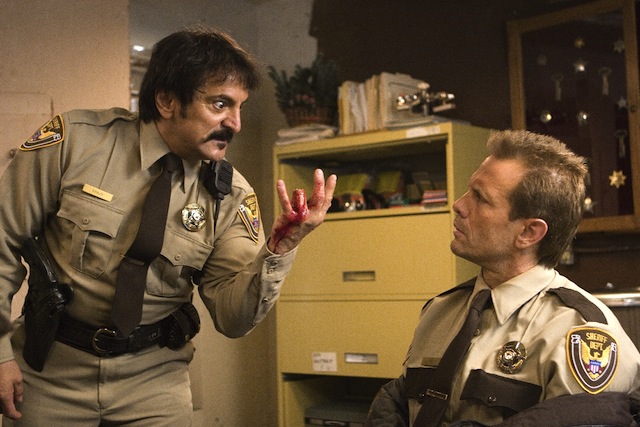
This is Robert’s brilliance I’ll tell you. There are two things about Robert and that’s why you’ve got to listen to him. When Savini comes in there and says “My hand! My Hand! I’m missing my finger!” He puts that finger up and I wanted to react to it like “Oh fuck, man!” Robert says “No, I don’t want you to do anything. I want you to just stare at it.” I’m like, “What?” He goes,” Yeah, I just want you to look at it.” “You don’t want me to react to it? He’s got his fucking finger cut off!” He’s like “Yeah, just don’t react to it…” I’m like “Okay Robert, you’re the fucking genius.”
So, I did it that way and if you look at the movie and you see my reaction to it, it’s very, very funny! (Laughs) And another thing he made me audition for him, he said “You auditioned Michael, but you had the role anyway. I just brought you into the audition to meet you.” He always saw me as that guy from the 1980’s, that iconic hero type guy of the 80’s, coming through those hospital doors in a tracking shot and the audience like standing up and clapping. He talked to me about that while we were making the movie and while we were making that shot and doing all of that hospital stuff and every time if you see that movie with a crowd, as soon as I come busting through that door everybody stands up like “Yeah!” He knew exactly what he was doing.
Quint: I love all of the fake trailers in Grindhouse, too, especially how they cross over with the features. Like your character popping up again in Eli Roth’s trailer for Thanksgiving. It just seemed that there was almost a genre art community theater thing going on there. (Laughs)
Michael Biehn: Well, you know it actually was kind of a fluke that I was in Eli’s trailer. I happened to be over in Czechoslovakia working on a movie while he was doing Hostel II and he was going to shoot the trailer over there. I happened to be over there on another movie and I think it was Greg Nicotero who was the special effects artists… Greg heard I was in town and I talked to Eli and told Eli that I was available if he wanted to throw me into that mix. You know, Robert had Jeff Fahey in the Machete thing and it was just kind of fun that way and so Eli immediately said “Yeah.”
I’ll tell you another thing that happened with Eli and this is the truth on this too… I went down there and I basically have this one shot, I reach down there and I scoop up the blood, I lick it, and I go “That’s blood” or “This is bad” or whatever is that I said. I did it the way that I wanted to do it a couple of times and then Eli was like “I want you to do it more like this…” I did it kind of like what he said, but not really because I kind of didn’t think that was right. Eli ended up saying “No, no do it like this.” So, he basically gave me a complete and straight-line reading and at this point I’m like “Okay Eli, here. ‘That’s blood.’ That what you wanted? That’s what you got. Fine. I’m gone.”
So now every time I talk to anybody and they go “The way you did that too was so fucking awesome!” That was Eli Roth, that line. That had nothing to do with Michael Biehn as an actor, that was Eli Roth’s performance.
Quint: It sounds like that’s a little frustrating for you as an actor, to have the director give you your performance, but do you ever look at any instances like that and go “Okay, well that was the right decision” or does it always just not feel right, because it’s not coming from you?
Michael Biehn: No, there are a lot of times that directors will want certain things. They will see a situation different than you do. That was certainly one that Eli had and he saw it a certain way and he had worked that way. I’ll basically fight, especially about the words of a script if they don’t make sense, I’ll fight and fight, but at the end of the day I’m working for the director and when he says “Do it like this” I do it like that.
I get along really well with big directors because I’m able to kind of add and help with the dialogue a lot of times and kind of rewrite and change things and make the movie better. I get into trouble when I’m working with directors that are kind of a lower level B directors and they don’t have any confidence and I start rewriting stuff and changing stuff and they think I’m taking over their set, but I don’t have any problems with it. If Eli Roth or Jim Cameron tells me how to do something, I mean I’d stand on my head buck naked in a movie for Jim Cameron if he asks me to, you know?
Quint: Well another thing that I wanted to touch upon is a movie that I hadn’t seen until I started trying to plug up some holes leading up to this interview and that was the complete insanity of Deadfall. It’s has Nic Cage’s most insane performance of all time. It’s the craziest thing he’s ever done and that’s saying a lot. There’s a scene in the car with you and him where it looks like you are trying to keep your composure when he’s just going off.
Michael Biehn: He was probably cracking me up, I mean Nic at that point was just breaking. He was just leaving the set to go do Saturday Night Live because he had just won the Oscar. That was Nic Cage undirected, because his brother directed him and I think he just said “Nic, do whatever you want.” I think Nic is best probably when he’s got somebody that just holds him back a little bit.
Quint: That’s pure, unrestrained Nic Cage. From my understanding even his costuming and all of that stuff was just him.
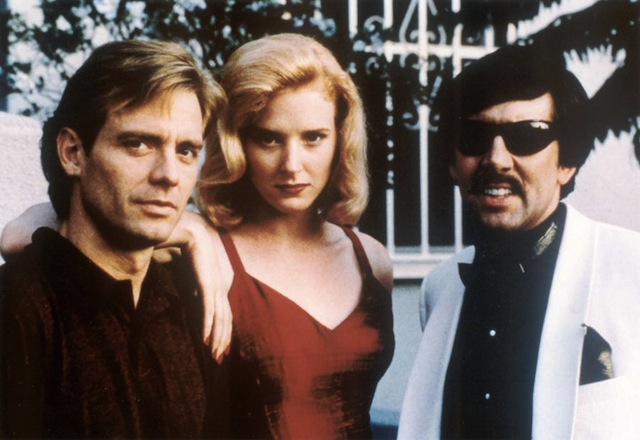
Michael Biehn: Yes and you know… It’s a bizarre little movie, let’s just put it that way. I actually did that… I got a call when I was doing a movie called Strapped which was Forrest Whitaker’s first directorial effort and I was doing that movie and I got a call because Val Kilmer and Joanne Whalley-Kilmer just fell out and they needed a replacement within like a week. So that was another one of those things where I got a call and flew into LA.
Val saw the writing on the wall. It was a good script, too. It was written by Nick Vallelonga, who’s a good friend of mine and has gone on to direct me in two or three movies. It was a good script, it was jut bizarre. It’s funny, because usually when people… When I try to think of the name of that movie, if you hadn’t just said “Deadfall” or had you said, “What’s the movie you did with Nic Cage and Charlie Sheen?” I always have this mental Freudian block and I can never remember the name of it. To be perfectly honest with you, I kind of have a bottom five of movies that I was in. That was one of them… One was called Megiddo.
Quint: Oh yeah, Brian Trenchard-Smith.
Michael Biehn: Another one was called Chain of Command, there’s Navy Seals and then I did one with Jennifer called Dead Men Can’t Dance. I think that would be on the bottom five list…
Quint: Not because of Jennifer, right? (Laughs)
Michael Biehn: No, no that’s where we fell in love. That’s where we met. My expectations were so high for it and it turned out to be so “so-so.”
Jennifer Blanc-Biehn: It was fine. It wasn’t in any great shakes, let’s put it that way. We did a movie together called The Ride years ago that you probably have not seen.
Quint: I have not.
Jennifer Blanc-Biehn: You should Netflix it. It’s a lovely little movie.
Michael Biehn: Made it for Billy Graham.
Quint: Oh, really?
Michael Biehn: Yep.
Quint: You went on a string of religious stuff then, because Megiddo was Omega Code 2, right? I guess because Brian Trenchard-Smith directed it that felt less like Kirk Cameron preachy than I was expecting when I saw it. It felt a little bit more like an exploitative Omen style movie.
Michael Biehn: They spent $20 million on that movie.
Quint: Holy shit, really? (Laughs)
Michael Biehn: They spent $20 million on it and the special effects at the end of it… when I saw that I couldn’t believe it. It looked like somebody had taken a cartoon and cut it out of its comic book and laid it on top of the film. It was so bad, the special effects, the visual effects. $20 million and I think it ended up with that company grossing about $4 million back, but that was a disaster.
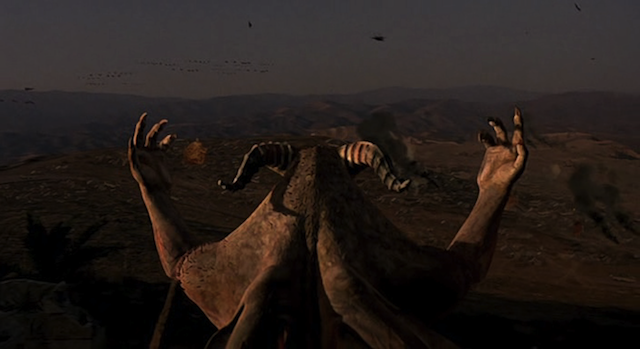
Quint: (Laughs) Even there I think you are actually really strong in the movie and I wasn’t expecting that. I like that you still managed to bring something to the lesser movies you appear in.
Michael Biehn: I try to keep my head above the fucking water as much as possible and if I think something is really stupid, I won’t say it. I have two ex-wives and I’ve had to take a lot of jobs that if I didn’t have a family I wouldn’t have taken them. I have ended up polishing turds and have tried to polish turds for them for a long time. I used to think if I had a turd that if I worked hard enough on it and I polished it enough that I could really make something out of it, but it always ended up kind of a turd. But I got good at writing!
Quint: How about The Divide?
Michael Biehn: The Divide is something I’m very proud of. It’s a performance piece, but it’s a psychologically violent film. It’s brutal. There is some violence in it, but not in the Saw/Hostel kind of way, it’s more about the story and it’s about these seven people are trapped in this bunker and they get sealed into this bunker and the food starts running out and people start getting crazy, some have radiation sickness and you know it’s rape and murder and torture and it’s about humanity really. It’s about going from Lauren (German)’s character, from like innocent to depravity.
It’s the animal instincts that you need to survive a situation and the acting in it is just superb. Again, I always say this, I look at everybody else’s acting in the movie and I just think it’s superb. I mean me, I’m like “Okay it’s me… It’s Michael Biehn, same old Michael Biehn,” but I just think it is so brutal to watch, but so beautiful to watch too because he shot it so beautifully and (director Xavier Gens) set up a situation where all of the actors got to create their own characters and improv things and we were improving scenes while we were shooting them and improving them in rehearsals and everybody was vying and fighting for material on the movie. Actors started taking camps, breaking into groups that were against other groups, like they did in the movie, that kind of carried over into real life.
It was a really tense set with a lot of anger and resentment and people being pissed off at each other and shouting at each other and then producers would have to come down and calm it all down. Xavier the whole time just kind of laughing and enjoying himself because he had set it up that way. He would basically say, “Here’s this scene, you guys do whatever you want.” Well, if you give that to me or Michael Eklund or Rosanna Arquette and we are going to take our chunk out of that scene one way or another! Everybody is in there fighting for that chunk.
Jennifer Blanc-Biehn: I got to play Michael’s wife in it.
Quint: You’re going to get typecast. (Laughs) How was that?
Jennifer Blanc-Biehn: It was a last minute thought of Xavier’s. Correct, Honey?
Michael Biehn: I don’t know if it was last minute. Jennifer was up there and she was with me and I think she made an impression on him just as a person and he got this idea that while I was kind of unconscious that I have a dream and he then decided to put Jennifer in it. Basically they had taken my computer and taken pictures out of the computer to put up as pictures of my wife who was no longer with me and my child.
Jennifer Blanc-Biehn: That’s how it started is that he had shot all of these photos of his family and then Xavier came to us and said “Hey, would you do me a favor? Would you shoot this scene where you come back to him as like an allegory?” I was like “Are you fucking kidding me? Xavier Gens? Yeah, okay, sure. No problem there.” I was just flattered and grateful to be part of such a great film.
Quint: Do you have a bigger part in The Victim?
Jennifer Blanc-Biehn: I have a huge part in The Victim.
Michael Biehn: She’s the heroine.
Quint: Oh, nice.
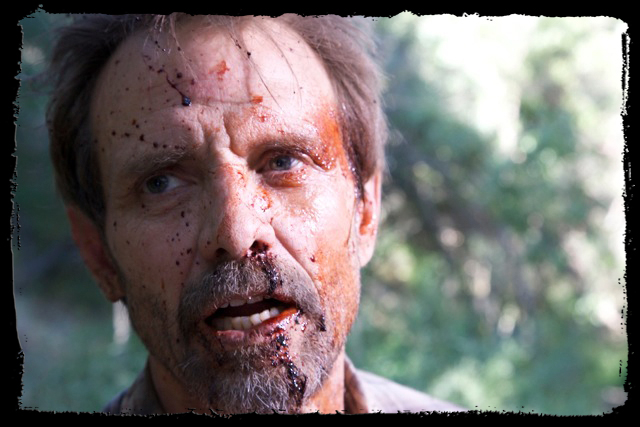
Michael Biehn: It’s basically an exploitation movie, a low budget exploitation movie. I saw a guy reading Rebel Without A Crew up in Winnipeg when I was doing Xavier’s movie and Robert and I had always talked about me directing and he was always saying, “Go do it Michael. Go make it. Go write something and go do it.” I said “I’m going to make a fucking exploitation movie here, what am I going to write it about?” I thought “Okay, I’m going to need sex, hot chicks, dirty cops, drugs, a little violence, a little action, and fuck it I’ll throw in a serial killer,” so I figured I’d touch all of the bases except for zombies. I didn’t get any zombies in there.
We shot it in 12 days on a pretty low budget. We are really, really happy with it to the point where we are talking about doing a sequel to it and starting a little franchise.
Quint: Nice. You were mentioning that you had polished a few turds, so was that part of the impetus of taking the creative reigns yourself?
Michael Biehn: I had gotten good enough polishing turds that I could write, yeah. That’s exactly right. Basically I’ve always been able to go to directors and say “This doesn’t work,” but instead of saying “This doesn’t work,” I’ve always got to like “How about this instead?” And I’ve always rewritten and changed things around, since I don’t want to go to a director and say, “This just doesn’t work.” I’ve always had way to solve problems.
Jennifer Blanc-Biehn: Michael is an incredible director. He got incredible performances from people. You’ve got to go to the movie’s website, it’s so up your guys’ alley. It’s truly exploitation; grindhouse, fun thrill ride with nods to all of these phenomenal directors. Robert watched it and said he really dug… at the end of the story there was a point where Michael has this speech that’s this incredible speech and I think Robert was impressed with Michael’s writing and I’m kind of impressed with Michael’s writing, is that fair to say?
Michael Biehn: Of course, it’s fair to say.
Quint: You guys have started screening The Victim then, yeah?
Jennifer Blanc-Biehn: We did like a work in progress screening in Kansas City.
Michael Biehn: That (cut of the) movie that they saw in Kansas was missing a lot of visual effects and it didn’t have end credits on it and there was still some work that needed to be done, but The Kansas City Film Festival called us, talked to Jennifer and you know wanted it pretty badly.
We went. We showed it in a huge theater with a huge screen. I walked into it and I was like… When I was making this movie I was always telling people “Don’t worry about that, man. People are going to be watching this on their telephone, don’t worry…” I walk into this theater and this is the biggest theater I’ve ever seen in my life. It’s one of those rounded IMAX-like deals with stadium seating. I mean it was like six times as big as the screen is that we are showing it on at The New Beverly, which is Quentin’s theater, and I thought “My poor little movie! All of the errors are going to come splashing out,” but it held up pretty well and the audience seemed to really enjoy it and clapped at the right places…
Jennifer Blanc-Biehn: And we learned something. It was interesting to do a work-in-progress screening because we learned a little bit about our own movie. You never really know where the audience is going to react and it was very cool for Michael and I to just be there and let them react where they were going to react.
Michael Biehn: It’s kind of a kitschy movie, you know. We pushed the performances and the whole piece to that level where you are almost over the top and it’s a lot of fun. It’s just fun and it was really never meant to be taken real seriously and I think audiences are kind of getting that. If you don’t like fuckin’ and you don’t like fightin’, then you might as well leave.
Quint: At least everybody will know what they are walking into, right?
Jennifer Blanc-Biehn: Totally.
Michael Biehn: If I can take your mind off your problems for 86 minutes and involve you in something else and you can enjoy it that would be the greatest compliment I could get; that it kept your attention.
Quint: So, it’s just like pure exploitation is what you are saying.
Michael Biehn: Maybe we are trying too hard, but we just want everybody to have a lot of fun and not take it for anything more than what it is.
Quint: You’ve been in the business for a long time, but this is the first time where you’ve worn all these different hats… writer, director, star, producer… was that overwhelming at any point or did it just feel natural?
Michael Biehn: It was overwhelming. A lot of times I’ve worked on movies before where I’ve taken on a lot of responsibility as far as kind of stepping into a director’s shoes who wasn’t quite on top of it as far as writing and stuff goes, helping him write, helping him know which takes to use, help him block scenes and so on and so forth, but this was very, very arduous. Even the post schedule was very hard work and very, very debilitating in a way that you just keep pushing this big rock up a hill and you just keep pushing it and pushing it and then it gets to the top of the hill and then it starts going down the other side and you start chasing it. (Laughs)
I’ve heard that before about movies and that’s kind of what it’s like, but I’ve finally got it behind me. Before people would say “Aren’t you proud of yourself?” I’m like “Not really, I’m still fucking frustrated about a lot of things and still upset,” but now I’ve got it behind me. I’ve done the best that I can. It’s a movie that I know a lot of people enjoy, because I’ve seen them and watched them enjoy it. Certainly it’s not going to be everybody’s cup of tea, but it’s something I’m very proud of and of Jennifer too.
I can’t express how much Jennifer really had to do with the making of the movie because she really brought the source material to me and she originally brought the money through a guy named David Ankrum, her agent, to me. He went out and found some financing for the movie, so it was really Jennifer who put those pieces together and then she produced throughout the movie and has continued to produce and was producing about five minutes ago before you called.
Quint: Welcome to low-budget filmmaking.
Jennifer Blanc-Biehn: That is so right, Eric. I mean we’ve learned a few things on this film. I wore a lot of hats. Michael wore A LOT of hats and there were probably five, six, or seven people who wore quite a few hats and it’s kind of evident in our end credits… you can see under people’s names it has like three jobs. It’s just a lot of work on everybody you know. You look at movies like Avatar and things like that that are so huge and you wonder how they are able to get those things done, but if you look at how many people they employ, they have $400 million and they have like 20,000 employees!
Quint: So what was more difficult Michael, directing yourself or directing your wife?
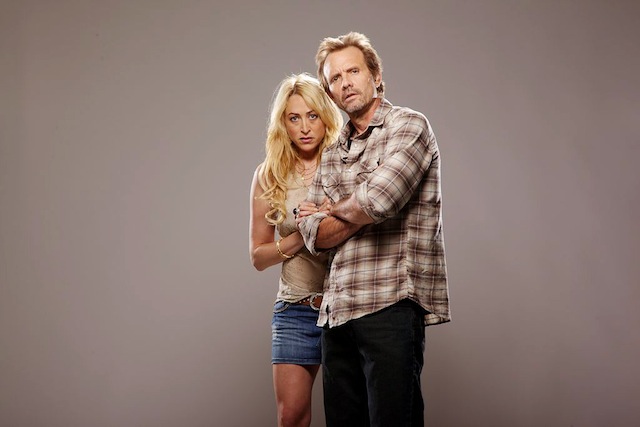
Michael Biehn: Oh, definitely directing her.
Jennifer Blanc-Biehn: Hey!
Michael Biehn: (laughs) The character that she played is always in such peril really. It’s one of these characters that can always be almost hysterical, almost always, and we kind of had to find a fine line where she was hysterical and even though these guys are out there trying to kill her, there comes a time where she kind of mellows out and then she becomes hysterical again… it was a tough performance, I think, for any woman. I think it was a difficult performance, but she finds a way to get there. It seemed like every time that I directed her, she got upset and angry at me because I’d say the wrong thing, you know?
I just say the fucking wrong thing! I’ll cut something and she will just be screaming “Why the fuck did you cut?” She gets more and more upset and then I’m like “Okay, action.” Because of the arguments that we had and because of the fighting while they were getting the camera ready to go again, a lot of times her best takes came after these nose to nose arguments about her performance and what she should do. The crew would be standing around looking at us while we scream at each other about what she should and shouldn’t do and how to get there. I basically screamed a performance out of her, like intimidated a performance out of her, you know? I did my best anyways. She’s good in it. Just from an acting standpoint alone she did a great job, but she’s done so much work on the movie.
Jennifer Blanc-Biehn: You know Eric, I can get you some pieces of the EPK of us screaming at each other.
Quint: (Laughs) Nice!
Jennifer Blanc-Biehn: It’s pretty fucking funny stuff. I mean, we cut it into the EPK because it’s funny. It’s him going (screaming) “You are not getting your lines” and me screaming “Why did you cut it?” Everybody else is just frozen and then we’d go back to normal and you see us kissing in the next shot just, like hanging out. “We’re good.” There’s some insanity around our little company in the way we make film, but it’s kind of cool and I think Michael has definitely got a style all his own and some people might calling it “Maniac Style” or some people might call it “passion,” but whatever it is he’s very, very passionate and serious about whatever he’s doing you know, even if it is a fun little movie you know.
Quint: Moving into the director’s side of things was there any particular filmmaker that you kind of studied? Maybe not even in person during your acting career, but just watching their films and stuff, was there anybody that you kind of took cues from?
MB: No, I wouldn’t say that. What I would say was everybody that you work with you learn from. I’ve worked with people… obviously Jim Cameron, you learn from people like Jim Cameron just from being on his set. I can’t tell you exactly what I learned from Jim, but I think that The Victim would have been a different movie would have been a different movie if I had never worked for Jim Cameron and I think it’s the same thing about Billy Friedkin you know? This would have been a different movie if I had never worked with Billy Friedkin. As a matter of fact, I know it would have been a different movie, because I know Friedkin had influence on me in the way that I directed this movie and I would say the same thing about Michael Bay and a few other directors. I think they just rub off on you and you don’t know exactly what it is and how it is, but these guys are brilliant men and they are great filmmakers. Quentin also was on the set a lot and he has his own style.
I think the writing of the script also was very much influenced by Quentin and Robert’s kind of stuff, you know? This is a movie that I’ve been giving a lot of praise to Robert for because I worked on his movie and decided I was going to make a grindhouse movie.
Jim Cameron has always said to me “You should direct movies, Michael” and Jim has always been very supportive of me when it came to directing a movie. I just never wanted to in the past. I just never really felt like I had this burning desire to do it, but when we were doing The Terminator, he would have me in the cutting room every day; showing me how he was cutting the TechNoir scenes together and he was one of the guys just teaching me, teaching me, teaching me what it is to be a filmmaker, what it is and how the special effects were done.
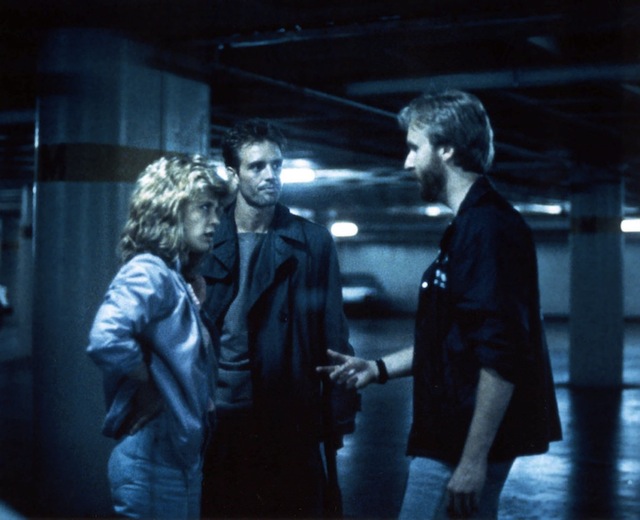
Quint: So, you went to the best film school with the best professors that you could possible have. (Laughs)
Michael Biehn: That’s exactly right. That’s absolutely right and I’ve been to some classes where the teacher wasn’t there either. (Laughs) I kind of had to step in and teach for him, so you know I was halfway there already I just had never gotten the title before on some of these smaller pictures that I’ve done. I didn’t want to look like an idiot when I was doing some of these smaller, stupider, straight to DVD (movies), that I wasn’t going to look like an idiot, so I would kind of rewrite stuff and change things. They would kind of move off into the background and I would end up not directing it, but at least having a hand in saying “We are going to go in this direction with it.”
I think it’s probably what you did if you’ve got a TV series, a guy like David Caruso or a guy like Billy Peterson… There might be a different director every show, but he’s there every week, so you know it’s his show. That’s the thing and on this one it was my show and I said “If I’m going to make one for this small amount of money, I have to make all of the decisions because I didn’t want to look like an idiot standing on a set that looked like a set or say really bad dialogue that didn’t make sense or have mismatches in clothing and all of that kind of stuff.
Quint: Having a low budget typically gives you more creative freedom.
Michael Biehn: Creatively, this is the best thing that’s ever happened to me because I was the studio, you know? Maybe not Jim Cameron, maybe not Steven Spielberg, maybe not JJ Abrams, and a few others, but most directors have to answer to some guys in suits who tell them that their movie is four minutes too long and to cut four minutes out of it. I didn’t have to do that at all. This was my movie from the beginning to the end.
I’ve learned from other directors who have had that opportunity that sometimes it’s easy to kind of go overboard and think that you have more than you do and you really should cut it down, so I brought in a lot of people that I respect, like Ross (Dinerstein) who produced The Divide, and said “What do you think? What do you think abut the length and cuts” and so on and so forth.
I know that as a filmmaker what happens is if you fall in love with your movie, you fall in love with all of it and you know all of it usually doesn’t work. Usually about 90% of it works, but it’s hard to cut that last ten percent out. So I had some people like Ross and some other friends of mine, Nick Vallelonga who’s a director, helped me out and we got it down to where it’s about 86 minutes long. I think it plays beautifully for the time that… It plays at the time that it’s supposed to play in, you know? It’s not too short, not too long.
Quint: Thanks again so much you guys. Good luck with The Victim. I’m looking forward to seeing it myself. This has been really fun for me. I hope it hasn’t been too excruciating for you guys.
Jennifer Blanc-Biehn: No, it’s awesome. Thank you so much, Eric.
Michael Biehn: Thanks, Eric.
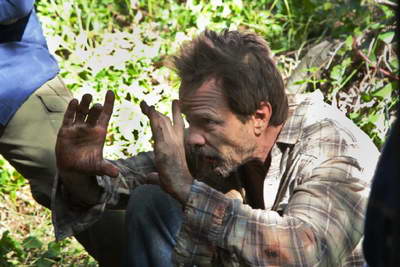
And that’s the big talk. Christ that was extensive and we didn’t even touch on his reappearing as Kyle Reese (ultimately to be cut out) in Terminator 2 or dwell upon The Abyss as much as I would have liked. But there’s only so much I can ask of this poor man.
Hope you guys dug the chat! Many thanks to Brian McQuery for connecting me and The Biehns and thanks to Michael and Jennifer for putting up with such an extensive chat!
My next AICN Legends interview is already in the can. In the coming weeks we’ll look back at Peter Jackson’s gore-fest Braindead (aka Dead Alive) with Weta’s own Richard Taylor! Expect some hilarious stories and some very rare BTS images from the making of the film.
-Eric Vespe
”Quint”
quint@aintitcool.com
Follow Me On Twitter

